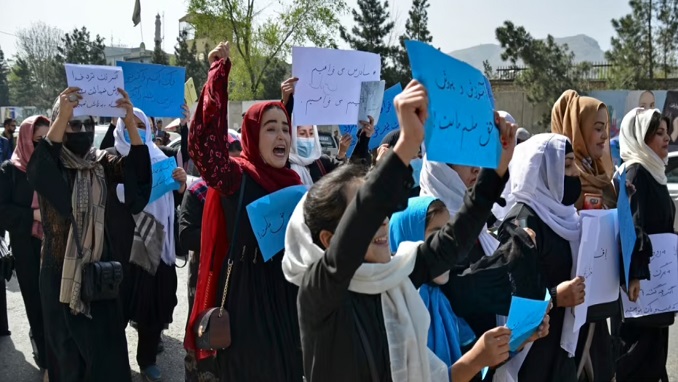A Taliban patrol rounded up on Sunday a small group of female activists that staged a protest rally in the Afghan capital of Kabul demanding the right to education for women and girls nationwide.
At least 25 veiled women and girls on the protest organized by the Afghan Women’s Political Participation Network demanded that Taliban authorities reopen schools and universities for girls, carrying placards saying “education is our right” and chanting slogans like “freedom, work, education.”
Protesters began their planned march from the Red Bridge area in western Kabul, reportedly planning to march toward the Asif Mayel Girls’ School – one of the dozens of schools the Taliban fighters and sympathizers violently attacked – and marched through the western Pol-e Sokhta neighborhood of the city before being forcefully dispersed by Taliban security forces that corralled them and prevent them from continuing.
One of the protesters, Momine Eftekhari, told Radio Azadi that Afghan women have been taken hostage and completely removed from society for almost two years, facing uncertain futures and fate.
Noting that they took to the streets because the situation was no longer tolerable, she stressed that education is the right of everyone, not only of boys but, despite international denunciation of the education ban and calls for lifting the ban, the Taliban did not allow girls to return to classes.
The ongoing strictures under the Taliban to keep women and girls out of schools, jobs, media, and other aspects of life have been strongly condemned by the international community and the UN, especially after the hardline militant group recently also banned female employees of NGOs from workplaces.
Following the UNICEF executive director Catherine Russell’s statement last week, urging the Taliban to allow all girls to resume classes with immediate effect, UNICEF reiterated the importance of educating Afghan girls in a tweeted video on Sunday underscoring that excluding girls from learning will have far-reaching consequences for Afghanistan’s already turbulent economy and health system.



